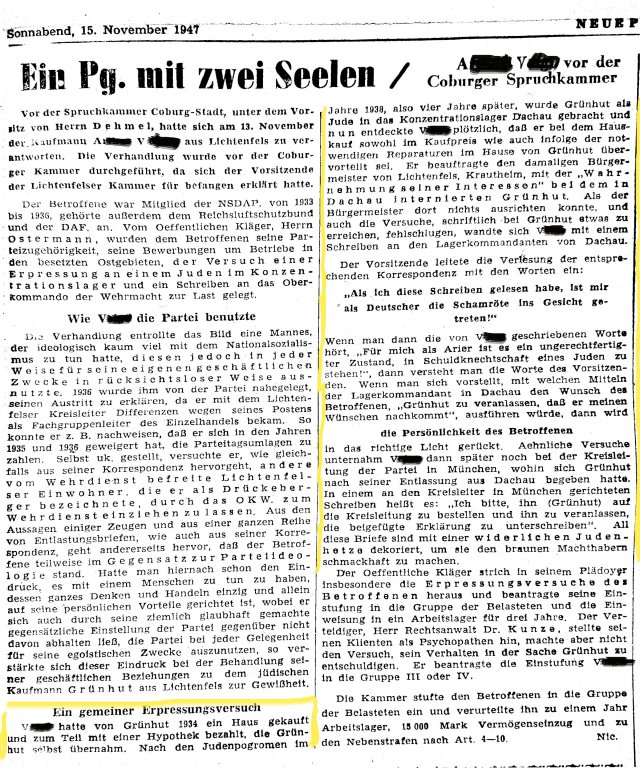He married Anna Schorsch, a native of Adelsheim, and moved with her in 1906 to what was then Coburger Strasse 106 in Lichtenfels, where he owned a store next door where he sold clothing. The couple quickly integrated themselves into the town life of the wicker town; they were members of the "Werdenfelser" - Society, and Sally was involved in the shooting club.
|
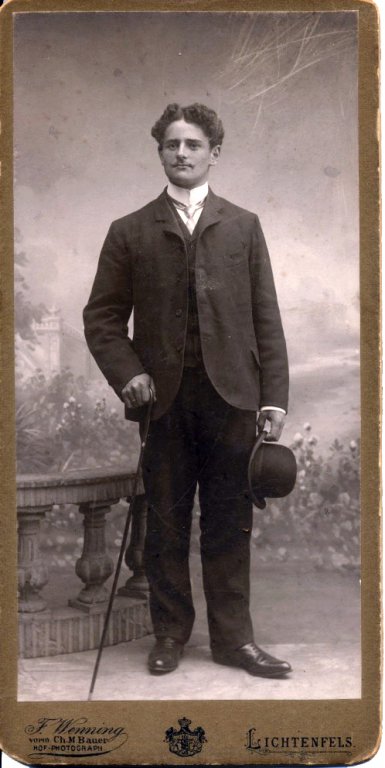
Sally as a joung man,
© Grünhut descendants
|
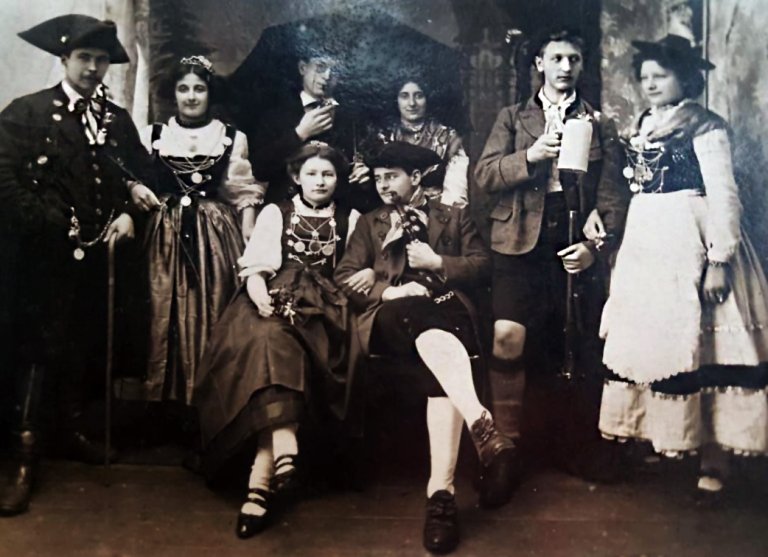 Sally and Anna in “Werdenfelser”- Costumes Sally and Anna in “Werdenfelser”- Costumes
(middle, sitting),
© Grünhut descendants
|
Sally and Anna had three children: Gertrude born February 12, 1907, Sofie born August 26, 1908, and Norbert on February 11, 1913.
During World War I, Sally Grünhut served in the 1st Bavarian Artillery Regiment, operating primarily in the French campaign in Lorraine. Business in the twenties allowed Sally to generously renovate and remodel his store in 1928.
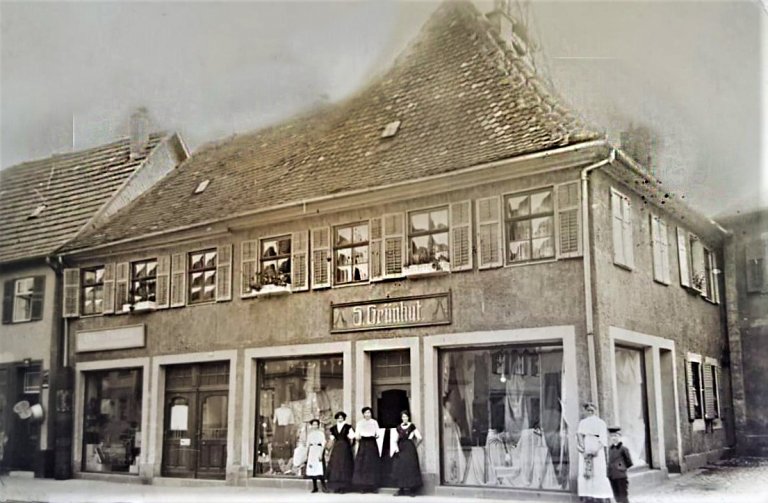 |
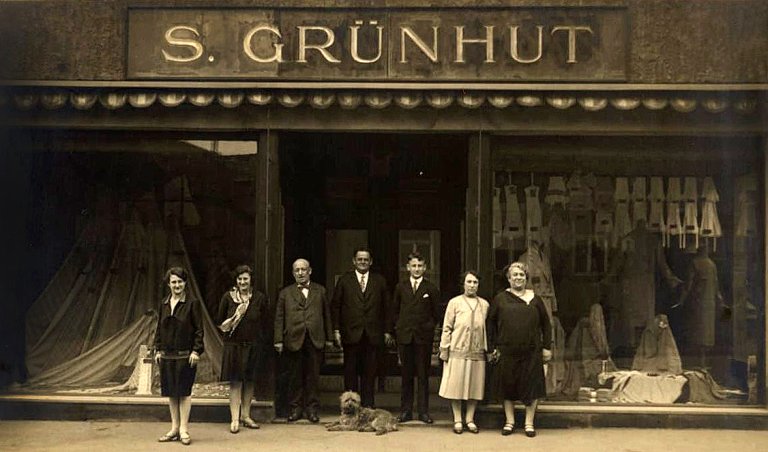 |
|
Reopening of the renovated store in 1928 (left: Old store).
© Grünhut descendants
|
On May 4, 1932, his wife Anna died of an illness at the age of only 52.
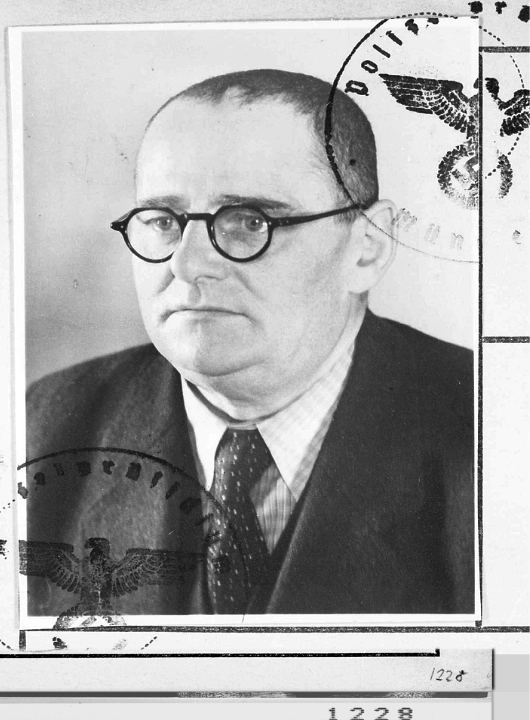
Passport, 1935,
© Grünhut descendants
|
With the rise of the Nazis, anti-Semitic harassment increased massively. Sally was not spared from them, especially since he had one of the worst Nazi thugs of the whole town as a neighbor. He was excluded from the shooters, and after a house search by SA men in 1933 he was already taken into "protective custody" for 42 days. Allegedly, his Nazi neighbor had hidden a rifle in Sally's yard and then called his cronies. After that he spent a lot of time with his daughter in Munich.
Two of his children noticed early on what was happening in Germany and emigrated to the USA in 1936. As a result, nothing held Sally in Lichtenfels any longer. Since the boycott of Jewish businesses meant that the store was not doing well either, and his only son Norbert understandably did not want to take over the business, Sally sold it at the end of November 1936. He moved to Munich for good on March 26, 1937, to live with Gertrude and her husband, the only close family members still living in Germany.
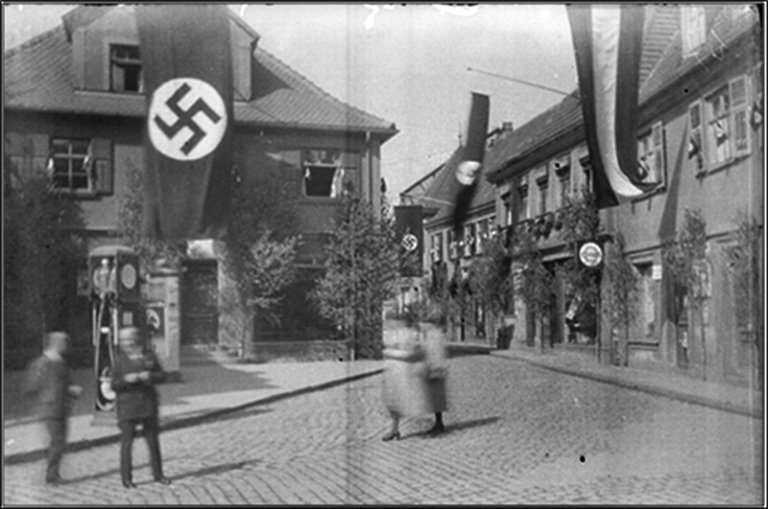 |
|
Neighbor’s house (left) on 1st of May 1934,
© MBL
|
But even in Munich he was not spared the Nazi reprisals. In the aftermath of the November pogroms in 1938, he was again taken into "protective custody," this time to the Dachau concentration camp. A Lichtenfels "fellow citizen" also tried to make the conditions of his imprisonment there more difficult for him in order to extort money he owed him. (see newspaper clipping)
Thus he decided to emigrate together with his daughter and her husband. This they did on March 31, 1939, and after a short stay in England they arrived in New York to join the other family members.
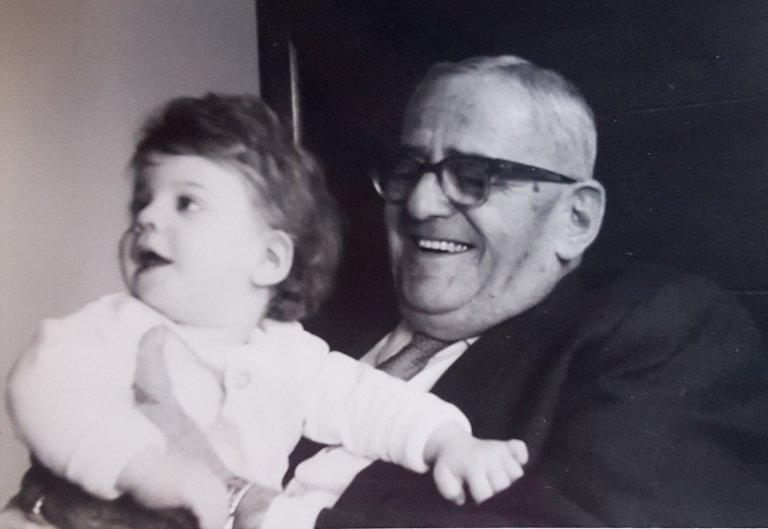 |
|
Sally as a loving Grandpa,
© Grünhut descendants
|
He spent a happy life there and always kept in touch with his children, grandchildren and great-grandchildren. After the war, Sally returned briefly to Germany for a business trip combined with a visit to his old home country. On April 22, 1968, Salomon Grünhut died at the age of 86.
Saturday, November 15, 1947 Neue Presse
A party comrade with two souls / A. V. in front of the Coburg Chamber of Spruchkammer
On November 13, the businessman A. V. from Lichtenfels had to answer to the court of Coburg-Stadt, chaired by Mr. Dehmel. The trial was held before the Coburg Chamber, as the chairman of the Lichtenfels Chamber had declared himself to be biased.
The person concerned was a member of the NSDAP, from 1933-1936, and also belonged to the Reich Air Protection Association and the German Labor Front. The public plaintiff, Mr. Ostermann, charged the person concerned with his party membership, his applications for businesses in the occupied eastern territories, the attempt to blackmail a Jew in a concentration camp, and a letter to the High Command of the Wehrmacht. […]
A vile attempt at blackmail
V. had bought a house from Grünhut in 1934 and paid part of it with a mortgage, which Grünhut took over himself. After the Jewish pogroms in 1938, four years later, Grünhut was brought to the Dachau concentration camp as a Jew, and now V. suddenly discovered that he had been cheated when buying the house, both in the purchase price and as a result of the necessary repairs in Grünhut's house. He commissioned the then mayor of Lichtenfels, Krautheim, to "protect his interests" in the Grünhut internment camp in Dachau. When the mayor could not do anything there, and also the attempts to achieve something in writing at Grünhut failed, V. turned to the camp commander of Dachau with a letter.
The chairman initiated the reading of the corresponding correspondence with the words
"When I read this letter, as a German, I blushed out of shame!"
When one then hears the words written by V., "For me as an Aryan it is an unjustified state of affairs to be in debt bondage to a Jew! When one imagines the means by which the camp commandant in Dachau would carry out the wish of the person concerned, "to arrange it so that Grünhut complies with my wishes," then the personality of the person concerned is put into perspective. V. later undertook similar attempts with the district leadership of the party in Munich, where Grünhut had gone after his release from Dachau. In a letter addressed to the district leader in Munich, it says: "I ask that he (Grünhut) be ordered to appear at the district leadership and that he be made to sign the attached declaration. All these letters are decorated with a disgusting Jewish hate symbols to make them palatable to the brown rulers. […]




 Sally and Anna in “Werdenfelser”- Costumes
Sally and Anna in “Werdenfelser”- Costumes 


